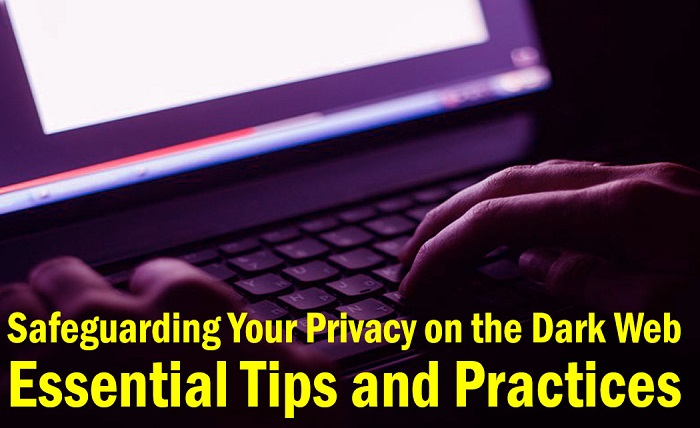Safeguarding Your Privacy on the Dark Web: Essential Tips and Practices

When venturing into the dark web, protecting your privacy becomes paramount. The anonymity and encrypted nature of the dark web can provide a layer of security, but it’s essential to take additional steps to safeguard your privacy. In this section, we will explore effective strategies and best practices to protect your privacy while accessing the dark web.
Use a VPN (Virtual Private Network):
Employing a reputable VPN service is crucial for maintaining privacy on the dark web. A VPN creates an encrypted tunnel between your device and the internet, effectively hiding your IP address and encrypting your online activities. By routing your connection through remote servers, a VPN adds an extra layer of security, preventing eavesdropping, tracking, and monitoring by internet service providers or malicious actors.
Tor Browser for Anonymity:
The Tor Browser is a powerful tool for preserving anonymity on the dark web. It routes your internet traffic through a network of encrypted relays, making it challenging to trace back to your original IP address. By using the Tor Browser, you can access dark web sites with an added layer of anonymity, as it masks your identity and encrypts your online communications.
Practice OpSec (Operational Security):
OpSec involves adopting security measures to protect your identity and activities. Start by creating a separate email address and pseudonymous accounts for dark web activities, ensuring they are not linked to your real-world identity. Avoid sharing personal information, including your real name, address, or contact details, on dark web platforms. Additionally, exercise caution when interacting with others, as divulging sensitive information can compromise your privacy.
Utilize PGP Encryption:
Pretty Good Privacy (PGP) encryption is a widely used method to secure communications on the dark web. PGP encrypts your messages, ensuring that only the intended recipient can decrypt and read them. By using PGP encryption for sensitive communications, you can add an extra layer of protection to your conversations, making them unreadable to unauthorized individuals.

Be Mindful of Dark Web Links:
When navigating the dark web, exercise caution when clicking on links. Dark web links can be risky, leading to malicious or fraudulent websites. Stick to trusted sources and reputable dark web directories to minimize the risk of encountering scams, malware, or phishing attempts. It’s advisable to copy and paste URLs instead of clicking on hyperlinks directly to avoid accidentally visiting potentially harmful sites.
Regularly Update Security Software:
Keeping your security software up to date is vital for protecting your privacy on the dark web. Ensure that your operating system, antivirus, and anti-malware software are regularly updated with the latest patches and security enhancements. Regular scans and updates help safeguard your system from potential vulnerabilities and emerging threats.
Employ Secure Payment Methods:
When engaging in transactions on the dark web, prioritize secure payment methods that offer additional layers of anonymity. Cryptocurrencies such as Bitcoin or Monero are often preferred due to their decentralized nature and pseudonymous transactions. Use reputable cryptocurrency wallets and take precautions to protect your wallet’s private keys to prevent unauthorized access.
Protecting your privacy on the dark web is essential to navigate its depths safely. By implementing these strategies – using a VPN, leveraging the Tor Browser, practicing OpSec, utilizing PGP encryption, being cautious with dark web links, updating security software, and employing secure payment methods – you can enhance your privacy and minimize the risks associated with exploring the dark web. Remember to exercise caution, stay informed about emerging threats, and continually adapt your privacy practices to ensure a secure and anonymous online experience.
Ensuring Anonymity on the Dark Web: Key Strategies and Practices
When navigating the dark web, maintaining anonymity is crucial to protect your identity and privacy. The dark web is known for its illicit activities and attracts both legitimate users seeking anonymity and malicious actors. To stay anonymous on the dark web, it’s essential to implement specific strategies and adopt best practices. In this section, we will explore effective techniques to help you maintain your anonymity while exploring the dark web.

Use the Tor Network:
The Tor network is a powerful tool for preserving anonymity on the dark web. It routes your internet traffic through a series of encrypted relays, making it difficult to trace back to your original IP address. By using the Tor Browser, you can access dark web sites anonymously, as it obscures your identity and encrypts your communications.
Employ VPN (Virtual Private Network):
Using a reputable VPN service alongside the Tor network can further enhance your anonymity. A VPN creates a secure and encrypted connection between your device and the internet, hiding your IP address and encrypting your online activities. By selecting a VPN server in a different location, you can add an extra layer of anonymity, making it challenging for anyone to track your online presence.
Create a New Identity:
When engaging in activities on the dark web, consider creating a new online identity. This involves using a pseudonym and separate email address specifically for dark web interactions. By decoupling your dark web activities from your real-world identity, you minimize the risk of being traced back to your personal information.
Use Encrypted Messaging:
To communicate securely on the dark web, utilize encrypted messaging platforms such as Signal or Wickr. These platforms offer end-to-end encryption, ensuring that only the intended recipient can decrypt and read your messages. By using encrypted messaging, you can protect the confidentiality of your conversations and prevent unauthorized access.
Be Mindful of Personal Information:
Avoid sharing any personal information that could potentially reveal your identity. This includes avoiding the use of your real name, address, phone number, or any identifiable details in dark web interactions. Even seemingly harmless information can be pieced together by skilled individuals to uncover your identity.
Employ Tails Operating System:
Consider using the Tails operating system, which is specifically designed for privacy and anonymity. Tails route your internet connections through the Tor network by default and do not leave any traces on the device you are using. It operates from a USB drive or DVD, allowing you to use a secure and anonymous system separate from your regular operating system.

Practice Good OpSec:
Operational Security (OpSec) is crucial for maintaining anonymity. Be cautious of what you share and whom you interact with on the dark web. Avoid clicking on suspicious links, downloading unknown files, or engaging in activities that could compromise your identity. Regularly review your privacy settings and be mindful of the traces you leave behind.
Conclusion:
Maintaining anonymity on the dark web requires a combination of technical tools, best practices, and a vigilant mindset. By utilizing the Tor network, employing a VPN, creating a new identity, using encrypted messaging, safeguarding personal information, utilizing the Tails operating system, and practicing good OpSec, you can enhance your anonymity and protect your privacy while exploring the depths of the dark web. Remember to stay informed about emerging threats, adapt your practices accordingly, and exercise caution at all times to ensure a secure and anonymous online experience.




